#been rewatching recently and felt the urge to create a text post compilation
Text
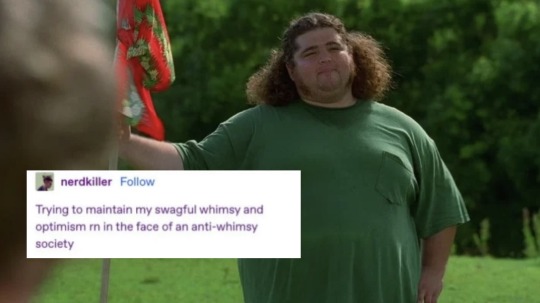
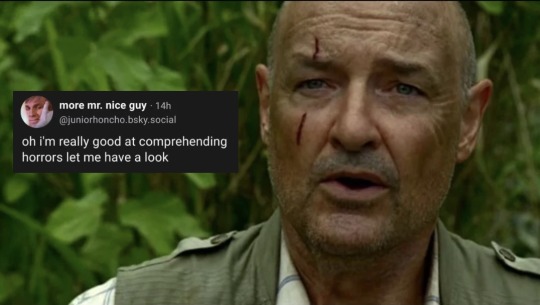
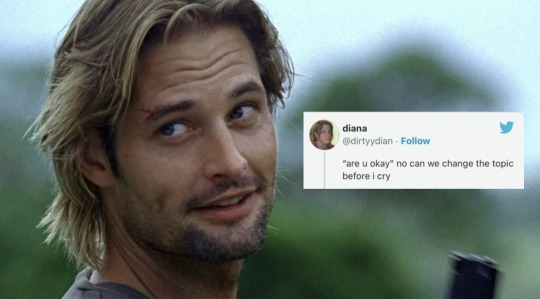
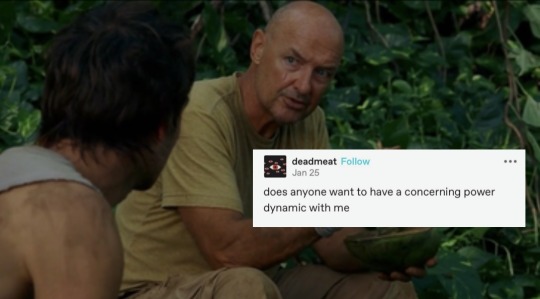
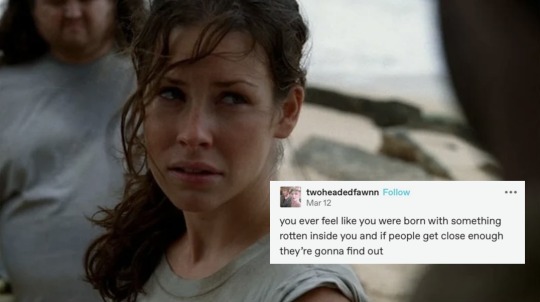
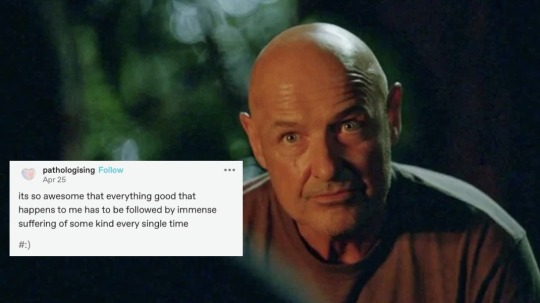
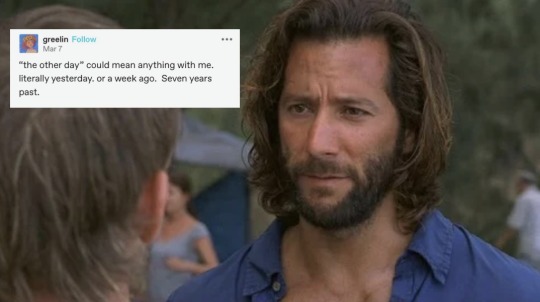
Lost + text posts
#been rewatching recently and felt the urge to create a text post compilation#I wish the fandom was more active#lost#lost tv show#lost tv#john locke#hugo reyes#hurley reyes#kate austen#sawyer ford#james ford#desmond hume#text posts
172 notes
·
View notes
Photo
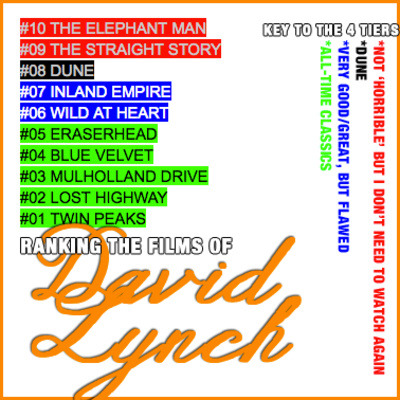
I am going to post this text which I used to make this 90-minute podcast where I ranked all of David Lynch's films. It’s close to 5,000 words long. Since I took the time to write all this out, I wanted to post it, edited for the page. Enjoy:
David Lynch has created ten feature films in forty years, specifically between 1977 and 2017. I am going to rank all ten films right now.
I’ve broken down the Lynch filmography into four tiers.
Tier #4 consists of two films that, while they’re not necessarily horrible, I’d be OK with never re-watching again.
Tier #3 is Dune, just… Dune… (crickets)
Tier #2 also consists of two movies, two features that are close to being really great, but are ultimately flawed for very different reasons.
And then there’s the Final Tier, Tear #1, ALL-TIME CLASSICS, of which, by my count, there are five. Not bad, considering that equals, oh I don't know... half of his filmography.
You might be wondering what constitutes an ALL-TIME CLASSIC... great question. In my book, it’s a movie that scores a 9.500 or higher on my highly scientific to-the-thousandths scale movie review scoring system. All ten of these feature films have been scored between 5.999 and 9.819. Using the thousandths scale allows for accessible gaps as I slowly fill in the list as I continue to compile my personal ranking of the greatest films ever made (and also... the not so great). I urge you to go to my website www.movies.myameri.ca to see the list of over 200 films that I've reviewed and ranked thus far.
Now, let’s get to the list...
#10
Perhaps, The Elephant Man––David Lynch’s second film, from 1980––doesn’t work for me because you can feel, in a sense, that he’s selling his soul. Sure, it's "good" and was recognized as such in all the ways and by all the metrics that the most mainstream critical pipelines assess and award art that is "good."
It's what I couldn't put my finger on at the time I recorded my initial review, and the truly repulsive thing about it: It's bad in the way these "good" films often are. It feels older than it is: a 1980 film about the 1920s that feels like it was made in the late 50s. It’s stylistic feel is both confusing and confused. The brief intrusions of Lynchian originality are present and welcome, but they’re all too quickly dispersed by stale set pieces, and performances that are either overwrought or stiffly boring. Only Freddie Jones, in the devious role of the elephant man’s original "handler," strikes a cord.
The look and feel of John Hurt’s titular character is effective, because it is grotesque. It is in no way fantastical, even if we’re looking at the height of movie magic, because this person existed. And through this realism, a sickening is induced. With every one of Hurt’s nasally slurps––while that’s surely the point, and it wholly succeeds on that level––the film becomes less re-watchable, a major tenant of my grading scale. Wherein Eraserhead’s baby is pure fantasy––a goofy, disgusting, horrifying little buddy that the viewer wants to spend time with––the Elephant Man is an abomination. Our horror with him, at him, over him, is both the movie proving its thesis, and shutting itself down.
David Lynch is on record as having been pleased with the film, but what amount of that pleasure has been framed by four decades of opportunity in large part because of its success, isn’t clear.
The Elephant Man was nominated for eight Academy Awards. No other David Lynch feature was nominated for more than one. It is his worst film by a wide margin.
#9
It would be easy to dismiss 1999’s The Straight Story as a joke disguised. Here was David Lynch making a relatively, well, "straight" movie about a man named Alvin Straight and it was titled The Straight Story. It was released by Disney. When I rewatched this recently I imagined what the movie might have been like if it had the same plot but, you know, felt Lynchian. What it would be like if the entire film had the tone of my favorite scene, the "I LOVE DEER" scene... but, alas, it isn't that.
The film is just a feel-good story. Sometimes, when you peel back the layers, there's just more goodness hiding underneath, and nothing more. And maybe there's a kind of horror in that as well.
#8
Dune stands alone.
Released in 1984, it's the only film among the ten wherein Lynch didn't have complete final cut. It's, by any classic metric, a bad film. At the end of the documentary Jodorowsky's Dune, which details one of the first attempts at bringing the best selling science fiction book of all-time to the big screen, Alejandro Jodorowsky describes going to see Lynch's version and being filled with a perverse glee that the movie was a failure, that it sucked. And it is definitely a failure.
The film is a god-awful mess. Do not under any circumstances attempt to watch the 3-hour "extended cut" version. Lynch had nothing to do with this and it does not re-insert anything by way of noteworthy lost footage. It merely accentuates the worst elements of the original theatrical cut. The biggest crime by far being... the dreaded voice-over, which plagues both versions.
In 2011, a YouTuber posted a 9-minute super-cut compiling all of these whispered voice-overs, which––if you aren't familiar––are meant to give more clarity to the story by presenting the audience an inside look at "the thoughts" in various characters' heads. But these "thoughts" do exactly the opposite: bogging down the story and actually making it harder to follow (in my opinion).
But even with all of its many, many flaws, the film is not without its charm. The look of it is extremely interesting, if not inconsistent. Some imagery looks dated, while other effects seem ahead of their time. The soundtrack, an amalgamation of Toto's overblown rock aesthetics and a nuanced main theme co-written by Brian Eno, is kind of awesome
But really Dune is just a huge mess of ideas. For example, in one scene the actor Freddie Jones is given a cat with a rat taped to its side, hooked to a contraption, and is told to "milk the cat" if he wants to stay alive. His character is never seen or mentioned again. These are the ideas of Frank Herbert told through the lens of David Lynch and filtered by producers who were so damn concerned whether or not the plot would make sense that they butchered the whole damn thing. What's left are pieces, intriguing pieces strewn about the 2-plus hours.
It would be easy to submit this film as the last place entry, #10 out of 10. But I just can't do that. I would re-watch this under the right circumstances. The strange convergence of wild visuals, bad editing and too-fast, too-big, too-soon nature of the production, puts this in a special category among the Lynch filmography. It almost hits "so bad it's good" notes, in a way. When Denis Villeneuve unleashes his high stakes, huge expectations version of Dune in 2020, David Lynch's third film will likely become nothing more than a footnote.... a grain of sand among the great DUNES of film history, one might say. (Sorry.)
#7
Inland Empire is, technically speaking, the final film of David Lynch's career. Released almost thirteen years ago in 2006, it's certainly the most confounding. Three hours of lo-fi footage, welded together by a director whose contempt for the industry he was a part of had reached a boiling point. And that boiling point is INLAND EMPIRE.
For years, I attempted to watch this film in stops and starts. That, for quite a long time, I never got past the relatively straight, narrative-driven first hour is probably telling. Outside of a classic Grace Zabriskie appearance as Laura Dern's crazy Polish neighbor, not much really happens.
But it isn't so much that nothing is happening that's the issue. It's that nothing interesting is happening. An actress gets a role. Her co-star is a womanizer. Her husband might be jealous. There's some mystery concerning the development of the project. They have an affair. After a burst of imagery at the start, this all unfolds in a fairly normal fashion. The most noteworthy thing about it is how it looks. Lynch used a digital camera to film some ideas with Laura Dern one day and then decided to make a feature film out of it. He's stated that he had to keep using the same camera out of necessity. That he had to make it look this way, is a very Lynchian answer to the question "Why does INLAND EMPIRE look like garbage?" Because it does truly look like trash. You can get better video fidelity from any cheap Android phone nowadays. It has not aged well.
Some might point to this and say that's exactly why it's genius, why it's underrated... but I ain't buying that line of thinking, either. It's a misstep, in my opinion. The film is a bloated experimentation of a script written on the fly. It has only one true saving grace... Laura Dern.
Even if they hadn't reunited for the successful collaboration that was Twin Peaks: The Return, I think I'd be OK with this being the pair's final work together. The film only works because of Dern. The entire thing is a testament to her ability and it transcends the hardware that was used to capture it. When I finally got around to completing this watch, I was struck by how weird it got. Which is saying something about a David Lynch film! Without Dern this might play like someone's forgotten student project of the mid 2000s. With her, it's a strange bookend to an amazing career.
One that I have no other choice but to start, and stop, and start again. Someday.
#6
Wild at Heart was produced at the height of David Lynch's success in 1990. Riding the high of Blue Velvet, arguably his most beloved work in a critical sense, even to this day, and filmed just as the world was experiencing TV’s Twin Peaks. Lynch's fifth movie arrived just as the concept of "Lynchian" was soaking into the cultural landscape. It's a brash, outrageous film that feels like the work of an individual who could no wrong. This cockiness both makes it fun, and provides its flaws.
While there seems to be "a point," however cloudy and/or veiled and/or vague, behind most things in every David Lynch film, Wild at Heart seemingly indulges in bombast for the sake of bombast. It's no surprise this Louis CK's favorite film and the film that nearly gave Roger Ebert a heart attack. (See this video)
I'd like to split the difference between those two sentiments, if I may. I don't agree that Lynch is always trying to "get off the hook" as Roger Ebert put it. But that may be the case with Wild at Heart. That it is the only Lynch film to take the top prize at Cannes, perhaps speaks more to the idea of Lynch and his influence in the culture at the time, then it does to the film itself. CK was right to read this film as a comedy, it's the only way it works. And Ebert was wrong to crucify it for being such. But It stands outside the top tier of Lynch's career for a different reason. With cockiness comes laziness. Lynch notoriously had his hands full during the development of this project, as he abandoned the TV world of Twin Peaks to make it. Wild at Heart feels half-baked as a result.
Sure, it has its moments. Willem DaFoe gets to hang his hat on the mantle of notable, completely over-the-top supporting characters in the Dennis Hopper / Frank Booth tradition. And Nicolas Cage and Diane Ladd are every bit as crazed in their performances as well. And yet, therein lies another problem: the movie has only one speed, out of control. The Sailor-Lula love story is meant to provide the downbeat, something earnest in a sea of chaos. But it falls short. You can't stop to smell the roses if the car never stops.
#5
That half of David Lynch's filmography constitute all time classics is no minor accomplishment. I imagine there are only a handful of directors with a better batting average. And so, the order of these next five films is fairly insignificant. Certainly there are biases at play which have placed them into the positions you find them here. For example, I certainly haven't watched Eraserhead enough and I've probably seen Mulholland Drive too many times by comparison. It's also about timing. Maybe This Moment™ in My Life™ is more fitting for Lost Highway then it is Blue Velvet, for myriad reasons, and so on and so on.
The thing to know is this... These five projects have all stood the test of time, and any one of them is deserved of the top spot. Now, back to the countdown...
Eraserhead was exactly like I thought it would be.
I neglected to watch this film for a very long time. I kept telling myself "Now is the right time to watch Eraserhead, Jeff." What I didn't realize until I finally watched it is that the answer to that question is both never and always.
Eraserhead is a feat of nature. A film that took years to complete feels and flows like it was molded together over a single month. It almost feels silly to expound on the film at this point. It's been dissected to death. Even critics who fail to understand it can appreciate it on the most basic of levels. This. Is. Art. PERIOD. There's no denying that.
Wherein the surrealists who decided to make films couldn't get past the concept of the singular idea, confining their work to shorts OR a series of loosely connected "living paintings," Lynch was able to extrapolate the aesthetic to feature length and also tell a story.
It's soundscape alone is a work of art, and perhaps the most important facet of the film from a historic point of view. This world sounds exactly as it looks: manufactured, fractured, jarring and glum. What brief respite the Lady in the Radiator provides with her haunting, off-kilter serenade is all we get by way of counterpoint to the unnerving soundtrack of Lynch's debut feature. It took Lynch, working in tandem with master sound engineer Alan Splet, nearly a year to complete. From the 1991 book, Midnight Movies:
"The soundtrack is densely layered, including as many as fifteen different sounds played simultaneously using multiple reels. Sounds were created in a variety of ways—for a scene in which a bed slowly dissolves into a pool of liquid, Lynch and Splet inserted a microphone inside a plastic bottle, floated it in a bathtub, and recorded the sound of air blown through the bottle. After being recorded, sounds were further augmented by alterations to their pitch, reverb and frequency."
Lynch's first film is also his shortest, just shy of ninety minutes, and it's hard to find any flaws. Is the detour with the severed head at the pencil factory meaningless? How about the next-door neighbor character... unnecessary? Inside the Top 5, I won't be nitpicking just to do so. In the Top 5, everything is fine.
#4
While I don't necessarily think Blue Velvet is the best film of David Lynch's career, it's hard to argue that it isn't the most important. It is the world from which all subsequent Lynch things are built. Following the creative and commercial disaster of Dune, Lynch's fourth feature is a dark psychological horror that both expands upon and completely blows apart the aesthetic of Film Noir. And there really isn't a single David Lynch film project after Blue Velvet which doesn't also explore this form to a degree.
The movie marks the debut of a pair who would turn out to be lifelong collaborators in the David Lynch cinematic universe: Laura Dern, acting here in one of her first "adult" roles at age 19, and the composer Angelo Badalamenti. Badalamenti would go onto write the scores for every subsequent entry in the filmography except Inland Empire, and his main theme to Blue Velvet remains one of the most memorable.
Blue Velvet is also notable as being a vehicle for Dennis Hopper's re-entry into mainstream cinema. Relaunching his career, Hopper's portrayal of the deranged Frank Booth remains as skin crawling as ever.
I think the fact that I have watched Blue Velvet and Mulholland Drive more than any other of Lynch's films had a lot to do with where I've placed them on this list (that they aren’t higher). But I swear I'm not being contrarian for contrarian's sake. As I said a minute ago, all five of these films are worthy. When it comes to the movies of David Lynch, well, I guess you could say, "....HE PUT HIS DISEASE IN ME." (Sorry.)
#3
The strange origin story of Mulholland Drive somehow eluded me for years. I only found out that this movie, Lynch's ninth, released one month after 9/11, was literally developed and shot with the intention to be a TV pilot for ABC. I found this out from the book, Room to Dream, by the way. The half autobiography/half biography of Lynch's life, which came out last year that I highly recommend. Only when it was clear that it wouldn't work for television did Lynch decide to re-cut and film additional footage to release as a feature. Though this was common knowledge, I managed to watch this many times over the years with no idea. When I rewatched it again recently with this information, I couldn't help but try to pick out what was filmed when in the timeline, and if I could see any inconsistencies... a true hellish way to watch a picture. I don't recommend it. But I digress..
From Blue Velvet on, each one of David Lynch's films (outside of The Straight Story) has had a longer running time. At close to 2½ hours, 2001's Mulholland Drive was his longest to date by a decent margin. It’s something of a misnomer that Lynch's films meander, as people mistake deliberateness for slowness or frivolity. Mulholland is filled with detours, inhabiting the film like micro movies in their own right. This also continues the loose Los Angeles trilogy (after Lost Highway and concluding with Inland Empire), which, at their heart, are films about coming to grips with who you really are. This might be the most direct lampooning of the film industry itself, but all three deal with being someone who you're really not.
Lynch has repeatedly stated his admiration for the 1950 film noir classic Sunset Blvd., another film about the film industry. In some respects, the naïveté of Naomi Watts' Betty is the counterpoint to Norma Desmond. In Mulholland Drive, her character says, "I'd rather be known as a great actress than a movie star. But, you know, sometimes people end up being both." Whereas, Norma Desmond portrayed by Gloria Swanson, has already reckoned with the true fate: "No one ever leaves a star. That's what makes one a star."
The arc of the characters—plural—Betty and Diane, and the power of Naomi Watts' performance as them both, is behind the wheel on Mulholland Drive. I found it odd that she took second billing in the opening credit crawl to co-star Justin Theroux. Was this because she was unknown to the masses at the time, or perhaps another piece of the puzzle to this movie's greater themes?
Mulholland Drive touches all the bases. At times bleak and bizarre. Sometimes bright and hopeful. In many ways, it's modeled after the next film on our countdown, as it can almost be read as two separate entities: converging, crossing and meeting together again? Well...
#2
No film surprised me more during my recent rewatch binge then 1997’s Lost Highway. David Lynch’s seventh film might be his most divisive, in so much as it failed to ignite the critical response that really any of his other films did upon their release.
While it’s industrial rock heavy soundtrack perhaps dates the film to its actual era of production more than any other Lynch picture, it also works as an anchor. Outside of Inland Empire, this is easily his most abstract and seemingly rambling work. It is grounded through style and feel. And it might just be his best singular statement.
Bull Pullman is a revelation as the jazz saxophonist Fred Madison. His chaotic emoting on the stage through his blaring instrument is but another counterpoint, this time to his subdued, confused off-stage demeanor. Who knew the goofy President from Independence Day could pull this off?
My critique of Patricia Arquette in many of her other roles is that she comes across as lifeless. Well, with her performance here as a dead-on-the-inside beauty, that mode has never played better. She's tremendous, acting the conduit in this strange play, this circuitous journey that is often described as a theatrical möbius strip, where our leading man has quite literally been replaced.
And that brings up another interesting point: There doesn't seem to be a traditional main character in this film. Arquette in her dual role as Renee and Alice is functionally it, but she gives way to Pullman and Balthazar Getty's Pullman––a car mechanic named Pete––for long stretches, and its Lynch's most diplomatic film in terms of dolling out the heavy lifting in this regard.
And last but not least we have to talk about... Robert Blake.
In a sea of outstanding, intensely weird and occasionally unforgettable supporting characters throughout the Lynch filmography, Blake’s Mystery Man might just take the cake. That Robert Blake, more than likely an actual sociopath, instructed Lynch on his character’s look––which, let me remind you was such: Blake decided to cut his hair cut extremely short, parted in the middle, white Kabuki make-up on his face, and an all black outfit––might be the best example of the auteur trusting his instincts, and having it pay off completely. Only on screen for a handful of scenes, Blake, who would be arrested and acquitted for the murder of his wife just a couple years later, delivers a truly unsettling performance. In his final film role ever, he encompasses true evil more than Twin Peaks’ BOB or Frank Booth in Blue Velvet. The Mystery Man is the lurking, vile corruption of what’s good that Lynch has always been looking for.
But Lost Highway is not a “what’s beneath the surface” film like Blue Velvet or Twin Peaks or even Mulholland Drive are. The “point” of Lost Highway might just be that evil exists in plain view... and there’s nothing we can do about it. Gary Busey sometimes has to watch his only child disappear in a lightning bolt of spoiled meat and that’s that. When they reappear, broken and struggling, and falling down the same path until it happens again, well... that’s just life.
One of my favorite parts of the entire movie is a scene early on when a detective asks Fred Madison if he owns a videocamera. His wife, Renee Madison, portrayed by Patricia Arquette, responds, "no, Fred hates them." Fred responds, "I like to remember things my own way." The detective asks, "what do you mean by that?" Bill Pullman, as Fred Madison, replies, "how I remember them. Not exactly the way that they happened."
#1
(DISCLAIMER: I’m sorry if you think it’s cheating that I am including the expanded Twin Peaks Universe as one single entry on this list. I’m sorry if you think the only thing that should count is Twin Peaks: Fire Walk with Me because that is the only Twin Peaks thing that is actually a “feature film.” But also: SORRY NOT SORRY.
This is my list and I’m putting Twin Peaks at #1, specifically: all of Season 1 of the original TV show, plus the beginning of Season 2 (until the episode where we find out who killed Laura Palmer) and the Season 2 finale. Then of course Fire Walk with Me, and the 18 hour MOVIE that is Twin Peaks: The Return, or Twin Peaks Season 3, if you will (I prefer the former as it gives the masterpiece the gravitas it deserves).
If you put a gun to my head and I ABSOLUTELY had to only include Fire Walk with Me, I would probably drop it to #4 or #5 and slide everything else on the list up a spot. End of DISCLAIMER.)
I was given the Twin Peaks Gold Box as a Christmas gift in 2007. The 10-DVD set had just come out and this was still an era when people treasured physical things like that. It was really important and meaningful to me, and I still own it despite no longer having a DVD player. Watching it for the first time was a treasure and a fond memory. The feeling I got when I heard that Badalamenti theme music start the show and everything in between...
...yes, even James in Season 2. I loved it all: the good, the bad and the ugly, the whole kitten caboodle. The original TV series is, obviously, far from flawless. Lynch stepped away for long stretches before going fully AWOL after it was revealed that Laura Palmer's father, portrayed by the great Ray Wise, is in fact her killer. After that, the show took a turn (to put it lightly).
But Lynch never gave up on the world. He returned to helm the stunning Season 2/de facto series finale. So much of the mythology that Fire Walk with Me and certainly The Return is built upon is ignited in that finale, fittingly titled "Beyond Life and Death." But really, the original series is most notable for merely existing at all. A precursor to the "golden age of television" that was right around the corner, there still hasn't been a network series remotely this daring. There's often much made, too much if you ask me, about the "cult of David Lynch." Critics of this “cult” say its followers are blind: The man can do no wrong. It's weird for weirdness' sake. And so on, they drone. Now, I'm a fairly big David Lynch fan (no duh). But I've always tried to remain grounded in regards to this. He's not perfect. But he has made near-perfect art. And I'm a fan of ART first. A practicer of admiration? Maybe some distant second, third, fourth or beyond. I see his infiltration of the masses with Twin Peaks as one of his finest achievements in the arts. How many powerful people had to be convinced that the mainstream was ready for something like this. It's baffling. That, of course, they weren't ready is kind of besides the point. Someone has to poke the bear.
If Lynch had closed the books on Twin Peaks with Fire Walk with Me, his sixth film released in 1992, that would have been fine. It's a polarizing feature and was a fairly significant box office bomb, even for Lynch. Fire Walk with Me nonetheless retains an otherworldliness among the filmography. Given the subject matter––you know, just your average super-violent father-daughter incest rape thing––it's hard to argue this isn't his darkest tale by a wide degree. It's perhaps not ripe for repeated viewings. In fact, I did not rewatch it for this review, the only film of the ten. Why? Well, I had given it a replay back in 2017, just before the debut of Showtime's Twin Peaks: The Return. And, to be honest, I just wasn't ready to return to this madness quite so soon.
Only David Lynch could mold one of the loftier aspects/thematic devices/main characters (?) of the long-awaited follow-up to perhaps his most beloved work on one of the most random, seemingly meaningless, toss-away lines spoken in a bad Cajun accent in a cameo role by David Bowie. "We're not going to talk about Judy at all..." Until, that is, the time is right... Say... 25 years later?
I just recently began to rewatch The Return and I'd like to say thank you for this, David Lynch. This needs to be put into the discussion with his greatest work, if it's not already there. I can recall after various episodes of its original run (May to September 2017), feeling a sense of awe and wonderment and confusion and joy. I say to anyone that's curious that this is an 18-hour movie. David Lynch made an 18-hour movie when it wasn't certain if he'd make any more movies again.
It would be dumb, if not downright foolish, to try and hash out the plot-lines or gush over Kyle MacLachlan's performance in not two, but three distinct roles. Here, the duality of man has fractured yet again in these modern times. And when I got to that final two-hour finale, I found myself on a family vacation. So I carved out a block of time to watch it at the house we were renting on my laptop, alone, in the dark, as the rest of my family enjoyed a sunny day at the beach. I filed Kyle and Laura Dern's Diane into one more sketchy motel and then onto El Paso, Texas, of course, just as everyone had guessed, and then back to Twin Peaks, Washington, where the series ends on a question... Special Agent Dale Cooper turns to Laura Palmer outside her childhood home and asks, "what year is this?" She screams into the abyss and the lights in the home spark off and the screen explodes into darkness. For a series that was, ultimately, about the passing of time as much as it was about the origins of evil in the universe or anything else, it was a fitting end.
0 notes